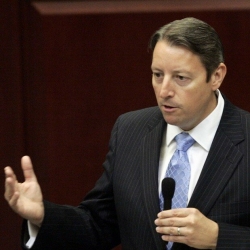During the current 60-day legislative session, the Florida state legislature might consider prop bets at sports arenas. Senate President Bill Galvano (R-Bradenton), considered an expert on Florida gambling because he has negotiated gaming compacts with the Seminole Tribe, named legalized sports betting as one of his priorities during the session.
If Bill Galvano has his way, then Florida sports fans would wager on a series of proposition bets using in-play mobile sports betting apps during the games they watch.
Given the fact Florida voters passed Amendment 3 last year, the idea seems far-fetched. Yet Galvano said of live sports betting, “It’s an activity that’s taking place presently, and if we can regulate it properly and have dollars come in, then we should do that.”
Sports betting was a non-starter until 10 months ago. In May 2018, the U.S. Supreme Court struck down the Professional and Amateur Sports Protection Act (PASPA), a federal law which allowed betting in 4 states while banning the practice in 46 other states. The result was individual US states can legalize sports betting within their borders, if they so wish.
Why Sporting Leagues Support Betting Apps
Brian Ballard, a lobbyist for Major League Baseball, the NBA, the PGA Tour, DraftKings, and FanDuel, said the landscape has changed in the past year. Not so long ago, the sports leagues led the fight against legal sports betting. Now they sign corporate partnerships with the very casinos and bookmaking companies they once fought in court.
Speaking on behalf of the leagues he represents in state capitals, Ballard added, “That’s a fundamental shift, where you see the leagues basically saying, ‘Yes, it’s here. We have to deal with it. Let’s make sure our product is protected and that states like Florida adopt best practices.’ And that’s what we’re hoping for.”
Bill Galvano Supports Licensed Sportsbooks
Bill Galvano says that mobile sports betting already takes place in every community in America, and that includes every corner of Florida. The American Gaming Assosiation (AGA) estimates that American wager $150 billion to $200 billion a year on sporting events — roughly 97% of that being done illegally. Galvano argues that states should legalize the practice, protect resident bettors with regulations and age verification technology, and collect revenues from the activity.
The Florida Senate President said it only makes sense to regulate and tax sports betting. The ban is ineffective, so the best way to protect the public is to undercut the bookies and illegal offshore betting sites. Galvano added, “My idea would be to conduct it in a way that it would render some equity and benefit to existing parimutuels that have had a relationship with the state for years and years.”
Would Require Sports Betting Amendment
Of course, Amendment 3 was designed to shut down gambling expansion in Florida — at least by the legislature’s personal fiat. To legalize any new form of gaming, the voters have to approve the measure in a statewide referendum. For that reason, Bill Galvano’s plans likely would not come to fruition until the November 2020 general election.
If voters passed a ballot initiative, then Galvano believes prop bets would be the best way to go. Galvano added, “I’ve heard all kinds of different feedback, that prop betting is a very profitable way of doing it.”
What Is a Prop Bet?
Proposition bets or “prop bets” do not focus on the final score of a game, but instead focus upon a single event happening during the game. A bettor might wager on who scores the next touchdown or who hits the next home run, or a wide variety of other hypothetical events in a game.
Sen. Galvano said prop bets bring with them some risk. If a golfer is up 7 strokes in a tournament and a gambler bets on the golfer to sink a putt on the 18th hole, the golfer might play it safe and go for a 2-putt.
Sports Integrity
The leader of the Florida Senate said lawmakers will have to address concerns about the integrity of sports if they go ahead with bookmaker legalization. Match-fixing is a concern, though pro athletes make so much money these days that illegal bookmakers and match fixers could not pay them enough money to throw games. The risk/reward simply doesn’t exist, because players can make more by winning games and making plays — which lead to bigger contracts.
A greater risk is college sports, because the athletes do not have multi-million dollar contracts on the line.
Betting Kiosks, Sports Betting Apps
Galvano says betting kiosks or windows at sporting events make the most sense. A betting window is similar to the method used for pari-mutuel wagers at race tracks for generations. Kiosks look more like an ATM machines, but are an electronic way to place a sports betting through automation. In either case, sports fans could make wagers while at a stadium or arena.
A more widespread option would be to allow live in-play betting on mobile smartphones and tablet computers. Live prop bets could be made on an Android phone, iPhone, or iPad in real time while people are on the go. To make it legal under US federal law, in-play betting would have to be done using geo-fencing systems which assure a player is inside the state of Florida.
To assure Floridians with concerns, Bill Galvano said lawmakers are a long way from approving such a law. But he said lawmakers owe it to Florida taxpayers to explore options that might lower property taxes or increase services. Defending the inclusion of sports betting in the legislative agenda, Galvano said, ““Are these things on the table? The answer is yes. Are we looking at all of them? The answer is yes. Have we gotten to a point where we’ve decided what goes into that bill? The answer is no.”

